Ney Thol is a Cambodian judge and member of the Khmer Rouge Tribunal. Thol was director of the School for Military Officers before being appointed president of the Military Court of Cambodia since 1987. [1]
Ney Thol is a Cambodian judge and member of the Khmer Rouge Tribunal. Thol was director of the School for Military Officers before being appointed president of the Military Court of Cambodia since 1987. [1]
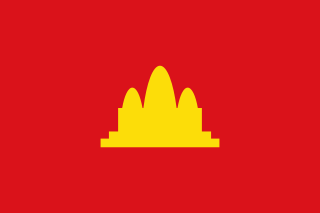
The Khmer Rouge is the name that was popularly given to members of the Communist Party of Kampuchea (CPK) and by extension to the regime through which the CPK ruled Cambodia between 1975 and 1979. The name was coined in the 1960s by then Chief of State Norodom Sihanouk to describe his country's heterogeneous, communist-led dissidents, with whom he allied after his 1970 overthrow.
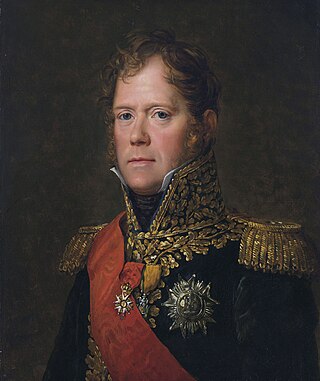
Michel Ney, 1st Duke of Elchingen, 1st Prince of the Moskva, was a French military commander and Marshal of the Empire who fought in the French Revolutionary Wars and the Napoleonic Wars. He was one of the original 18 Marshals of the Empire created by Napoleon I.
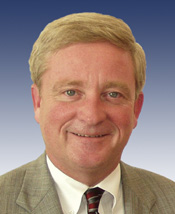
Robert William Ney is an American politician from Ohio. A Republican, Ney represented Ohio's 18th congressional district in the U.S. House of Representatives from 1995 until November 3, 2006, when he resigned. Ney's resignation took place after he pleaded guilty to charges of conspiracy and making false statements in relation to the Jack Abramoff Indian lobbying scandal. Before he pleaded guilty, Ney was identified in the guilty pleas of Jack Abramoff, former Tom DeLay deputy chief of staff Tony Rudy, former DeLay press secretary Michael Scanlon and former Ney chief of staff Neil Volz for receiving lavish gifts in exchange for political favors.

Sisowath Monivong was the King of Cambodia from 9 August 1927 until his death in 1941. During his reign, Cambodia was a French protectorate. Monivong was the grandson of the poet-king Ang Duong, grandfather of Norodom Sihanouk and the great-grandfather of the current king, Norodom Sihamoni. His full regnal title and style was Preah Bat Samdech Preah Serey Monivarman Krom Luang Chao Chakrabangsa Sisowath Monivong Ney Preah Reacheanachak Kampuchea which can be literally translated from Khmerized Sanskrit as "His majesty, glorious lord scholar-protector; His highness, lord of land and sea, Sisowath Monivong of the Kingdom of Kampuchea". He is the most recent monarch from the House of Sisowath, as all his successors are members of the House of Norodom.

Preah Vihear Temple is an ancient Khmer temple built during the period of the Khmer Empire, that is situated on the top of a 525-metre (1,722 ft) cliff in the Dângrêk Mountains, in the Preah Vihear province, Cambodia. In 1962, following a lengthy dispute between Cambodia and Thailand over ownership, the International Court of Justice (ICJ) in The Hague ruled that the temple is in Cambodia.
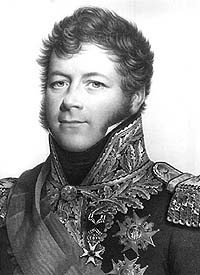
Nicolas Joseph Maison, 1st Marquis of Maison was a Marshal of France and Minister of War.

The Coalition Government of Democratic Kampuchea, renamed in 1990 to the National Government of Cambodia, was a coalition government in exile composed of three Cambodian political factions, namely Prince Norodom Sihanouk's FUNCINPEC party, the Party of Democratic Kampuchea and the Khmer People's National Liberation Front (KPNLF) formed in 1982, broadening the de facto deposed Democratic Kampuchea regime. For most of its existence, it was the internationally recognized government of Cambodia.

The prime minister of Cambodia is the head of government of Cambodia. The prime minister is also the chairman of the Cabinet and leads the executive branch of the Royal Government of Cambodia. The prime minister is a member of parliament, and is appointed by the monarch for a term of five years. Since 1945, 36 individuals have served as prime minister; 32 as official prime ministers, and 4 in acting capacities.Hun Sen, of the Cambodian People's Party, has been the incumbent prime minister since 1985. He served from 1985 to 1993 and was Second Prime Minister from 1993 to 1998 alongside Norodom Ranariddh (1993–1997) and Ung Huot (1997–1998). Elected as prime minister in his own right in 1998, he is the longest serving prime minister in Cambodian history.
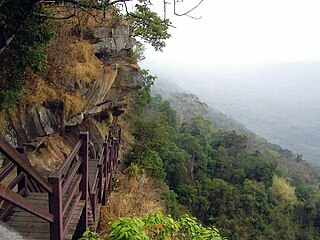
Khao Phra Wihan National Park is a protected natural area in Sisaket Province, Thailand, that contains numerous ruins of the 11th century Khmer Empire. The park lies 98 km (61 mi) south of the town of Sisaket, at the end of Thai highway 221. Sited on a red stone cliff that is part of the Dangrek mountain range on the southern edge of the Khorat Plateau, it abuts the international border between Thailand's Sisaket Province and Cambodia's Preah Vihear Province. The name of the cliff in the Royal Thai General System of Transcription is Pha Mo I Daeng (ผามออีแดง). The park was established on 20 March 1998, with an area of 81,250 rai ~ 130 square kilometres (50 sq mi)
Schlesinger v. Holtzman, 414 U.S. 1321 (1973), was a case decided by the Supreme Court of the United States involving the Constitution's War Powers Clause. The Court reversed a ruling by Justice William O. Douglas ordering the military to stop bombing Cambodia.

The Extraordinary Chambers in the Courts of Cambodia, commonly known as the Cambodia Tribunal or Khmer Rouge Tribunal (សាលាក្ដីខ្មែរក្រហម), was a court established to try the senior leaders and the most responsible members of the Khmer Rouge for alleged violations of international law and serious crimes perpetrated during the Cambodian genocide. Although it is a national court, it was established as part of an agreement between the Royal Government of Cambodia and the United Nations, and its members include both local and foreign judges. It is considered a hybrid court, as the ECCC was created by the government in conjunction with the UN, but remains independent of them, with trials held in Cambodia using Cambodian and international staff. The Cambodian court invites international participation in order to apply international standards.

Ney is an Ortsgemeinde – a municipality belonging to a Verbandsgemeinde, a kind of collective municipality – in the Rhein-Hunsrück-Kreis (district) in Rhineland-Palatinate, Germany. It belongs to the Verbandsgemeinde Hunsrück-Mittelrhein, whose seat is in Emmelshausen.

The Cambodian–Thai border dispute began in June 2008 as part of a century-long dispute between the Kingdom of Cambodia and the Kingdom of Thailand involving the area surrounding the 11th-century Preah Vihear Temple, in the Dângrêk Mountains between Choam Khsant District, Preah Vihear Province of northern Cambodia and the Kantharalak District, Sisaket Province of northeastern Thailand.

Bilateral relations between Cambodia and Thailand date to the 13th century during the Angkor Era. The Thai Ayutthaya Kingdom gradually displaced the declining Khmer Empire from the 14th century, importing much of its customs and culture. French protectorateship separated Cambodia from modern Thailand at the turn of the 19th–20th centuries, and diplomatic relations between the modern states were established on 19 December 1950.
Tan Thol is a former Cambodian cyclist. He competed in the 1000m time trial and men's sprint events at the 1964 Summer Olympics.
Thoeun Thol is a Cambodian swimmer. He competed in the men's 50 metre butterfly event at the 2017 World Aquatics Championships.
The Supreme Court of Cambodia is the highest Court in the judiciary of Cambodia, under the supervision of the Supreme Council of the Magistrature. It is located in the royal capital of Phnom Penh, and is regulated under Article 55 to Article 73 of the 2014 Cambodian Law on Court Organization.

The Judiciary of Cambodia is independent from the rest of the government of Cambodia, as specified by the Cambodian Constitution. The judiciary follows civil law tradition, the instruction being entrusted to a judge and the prosecutors contenting themselves with requesting the application of the law.

The law of Cambodia refers to the legal system of the judiciary of Cambodia, which is primarily based on legal codes and statutes, with precedents and local custom also playing an important role. Cambodia has a civil law legal system with legal codes, which were greatly influenced by France, to a lesser extent by Japan, and also adapted to Cambodian circumstances. The Constitution of Cambodia enacted with the restoration of Monarchy in 1993 and it is the supreme law in Cambodia. An independent judiciary has the power to review laws and government acts for constitutionality.
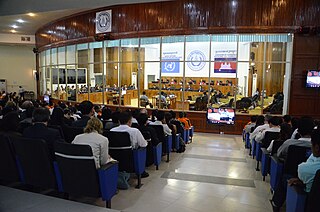
An extraordinary court, or special court, is a type of court that is established outside of ordinary judiciary, composed of irregularly selected judges or applies irregular procedure for judgment. Since extraordinary court can be abused to infringe fundamental rights of individuals, contemporaly most of countries ban such courts by constitution or statutes. Usually, modern military courts judged by court-martials are regarded as examples of extraordinary courts.